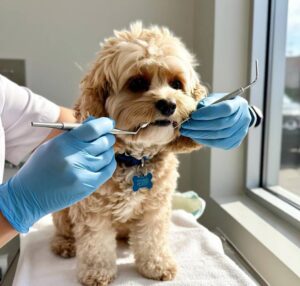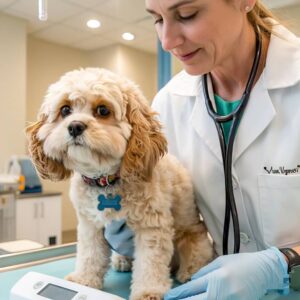Cavapoo Health: Common Issues and How to Prevent Them
informative post about common health issues affecting Cavapoos, such as Mitral Valve Disease and Syringomyelia, and tips on prevention and management.
Cavapoos, a charming hybrid of the Cavalier King Charles Spaniel and the Poodle, have gained immense popularity among dog lovers due to their affectionate nature, intelligence, and hypoallergenic coat. As with any breed, however, Cavapoos are susceptible to certain health issues that pet owners should be aware of to ensure their furry companion lives a long, happy, and healthy life. In this article, we’ll explore some of the most common health problems Cavapoos face and provide practical tips on how to prevent or manage them.
1. Hip Dysplasia
What is it?
Hip dysplasia is a hereditary condition in which the hip joint doesn’t fit into the hip socket properly. This can lead to pain, arthritis, and eventually mobility issues if left untreated.
How to prevent it?
While genetic factors play a major role in hip dysplasia, responsible breeding practices can reduce the likelihood of this condition. Ensure that you purchase your Cavapoo from a reputable breeder who tests both parent dogs for hip dysplasia.
Management & Treatment:
If your Cavapoo is diagnosed with hip dysplasia, treatment options include weight management, anti-inflammatory medications, joint supplements, and in some cases, surgery. Keeping your Cavapoo at a healthy weight and avoiding excessive jumping or strenuous exercise can also help prevent further stress on their hips.
2. Heart Problems
What is it?
Cavapoos are prone to heart conditions, especially mitral valve disease (MVD), a common heart issue in Cavalier King Charles Spaniels. MVD can lead to heart failure if not managed properly.
How to prevent it?
Again, responsible breeding is crucial. It’s important to ensure that the parent dogs have been checked for heart conditions and have a clean bill of health. Regular veterinary checkups are also essential for early detection.
Management & Treatment:
Treatment typically involves medication to help manage symptoms, as well as maintaining a healthy diet and regular exercise. If the condition worsens, more advanced treatments, such as surgery, may be required.
3. Ear Infections
What is it?
Due to their floppy ears, Cavapoos are more prone to ear infections than breeds with upright ears. The moist environment inside the ear canal can lead to bacterial or yeast infections, causing discomfort and potential hearing loss if untreated.
How to prevent it?
Regular ear cleaning is vital. Use a vet-approved ear cleaner and a cotton ball to gently clean your Cavapoo’s ears once a week. Make sure their ears are dry after baths or swimming, and trim the hair around the ear canal to allow for better air circulation.
Management & Treatment:
If your Cavapoo shows signs of an ear infection (such as head shaking, foul odor, or excessive scratching), consult your vet. They may prescribe ear drops or antibiotics to treat the infection.
4. Eye Issues
What is it?
Cavapoos can inherit eye problems from their Cavalier King Charles Spaniel parent, such as cataracts, progressive retinal atrophy (PRA), and dry eye (keratoconjunctivitis sicca). These issues can lead to vision impairment or even blindness.
How to prevent it?
Regular eye exams are crucial for early detection of eye diseases. Ensure your Cavapoo’s breeder tests for hereditary eye conditions, and keep an eye on your dog for any signs of discomfort or vision changes.
Management & Treatment:
Depending on the condition, treatments may range from prescription eye drops to surgery. For example, cataract surgery can restore vision if caught early. However, if your Cavapoo experiences progressive eye conditions, managing their comfort and quality of life will become a priority.
5. Allergies
What is it?
Cavapoos, like other Poodle mixes, can be prone to both food and environmental allergies. Common triggers include certain proteins, pollen, dust mites, and even flea saliva. Symptoms often include itching, ear infections, and gastrointestinal issues.
How to prevent it?
Identifying and avoiding allergens is the key to preventing flare-ups. If you suspect your Cavapoo has an allergy, consider an elimination diet under the guidance of a vet to pinpoint any food sensitivities. For environmental allergies, regular cleaning of your home and bathing your dog with hypoallergenic shampoo can help reduce exposure.
Management & Treatment:
Antihistamines, steroids, or special allergy treatments prescribed by your vet can help manage symptoms. Flea prevention treatments should also be a priority, as flea allergies are particularly common in small breeds.
6. Dental Problems

What is it?
Like many small dogs, Cavapoos can suffer from dental issues such as periodontal disease, gum inflammation, and tooth decay. Dental problems can be particularly problematic if not addressed early, leading to tooth loss or systemic infections.
How to prevent it?
Regular brushing of your Cavapoo’s teeth is essential. Aim for at least 2–3 times a week, using dog-specific toothpaste and a soft-bristled toothbrush. Providing dental chews and toys can also help keep their teeth clean and reduce plaque buildup.
Management & Treatment:
If dental disease is already present, your vet may recommend a professional cleaning or even tooth extractions. Routine dental checkups can catch issues before they become serious.
7. Weight Management Issues

What is it?
Cavapoos are prone to becoming overweight or obese, especially if their diet isn’t controlled or if they don’t get enough exercise. Extra weight can exacerbate joint issues like hip dysplasia and lead to heart disease, diabetes, and other complications.
How to prevent it?
Maintain a consistent, balanced diet tailored to your Cavapoo’s age, size, and activity level. Regular exercise is key to keeping them fit and healthy. Aim for daily walks, play sessions, and mental stimulation to prevent boredom.
Management & Treatment:
If your Cavapoo is overweight, your vet can guide you in creating a safe weight loss plan. This usually includes a controlled diet, portion management, and increased physical activity. Regular weigh-ins can help track progress.
Conclusion: Prioritize Prevention and Regular Care
As a responsible Cavapoo owner, staying proactive about your dog’s health is key to preventing many common issues. Regular veterinary checkups, a balanced diet, and appropriate exercise can go a long way in ensuring that your Cavapoo stays happy and healthy for many years. Early detection of health concerns can also lead to more successful treatment, so always keep an eye out for any unusual behavior or signs of discomfort in your furry friend.
By addressing these potential health problems head-on and taking steps to prevent them, you’ll be able to enjoy a long and rewarding companionship with your Cavapoo.
Call to Action:
Is your Cavapoo experiencing any of these issues? Don’t wait to get them checked by a vet. Regular health screenings and early intervention can make all the difference. Schedule an appointment with your vet today to keep your Cavapoo in tip-top shape!

